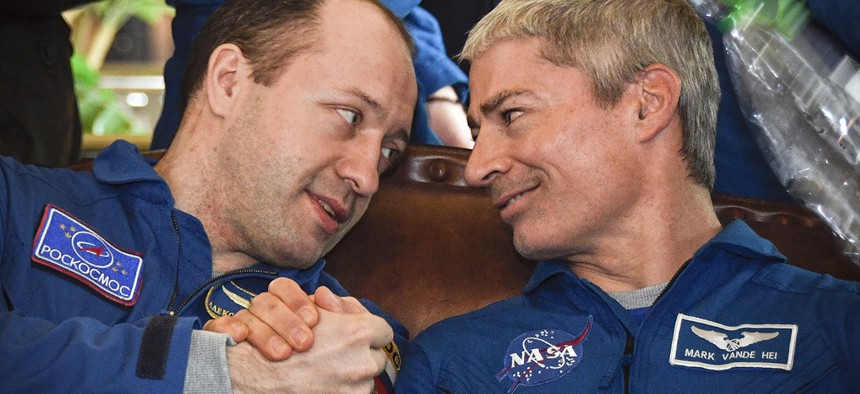The Chill of U.S.-Russia Relations Creeps Into Space

Russian cosmonaut Alexander Misurkin, left, shakes hands with NASA U.S. astronaut Mark Vande Hei during a press conference in the Kazakh town of Zhezkazgan, Kazakhstan, on Wednesday, Feb. 28, 2018. Alexander Nemenov/AP
Bungled plans between the U.S. and Russia highlight how hot-and-cold international relations mess with space exploration.
On the afternoon of the failed launch, Jim Bridenstine of NASA and Dmitry Rogozin of Roscosmos had only known each other for a few days. Less than one mile from the launchpad, the heads of the American and Russian space agencies watched as the Soyuz system lofted the crew, one man from each country, into the blue sky over Kazakhstan.
But then, inside the crew capsule, alarms blared and emergency lights flashed. Instead of climbing into space, the capsule began to plunge back to Earth. In those stressful moments—before the capsule parachuted gently to the ground, before rescue crews arrived, before the would-be space travelers reunited with their family—each official considered what he might say if the failed launch ended in tragedy.
“If we’re going to strengthen the partnership with the United States and Russia on space exploration, I think this was probably one way to do it,” Bridenstine told me later, after he had returned to the United States. “Everybody became a lot closer on this day.”
On the ground, the United States and Russia might have conflicting interests, but in space, 250 miles above Earth, they get along nicely. On the International Space Station, American astronauts and Russian cosmonauts share meals, routines, and a stunning view of our little planet. That same spirit of cooperation characterized the handling of the failed launch in October—the quick rescue response, the careful investigation of hardware, the eventual return to spaceflight less than two months later—and after Bridenstine’s visit to Russia, he sought to reciprocate the invitation. Bridenstine had addressed Rogozin’s alma mater, Moscow State University, and he suggested that in early 2019 Rogozin deliver a speech at his own, Rice University in Texas.
But even in a bromance as sunny as this one, sometimes politics finds a way to creep in, and Bridenstine rescinded his invitation. And according to Russian media, Rogozin isn’t happy about it.
Some current members of Congress and former national-security officials, mostly Democrats, saw the proposed visit as a mistake, Politico reported, and more lawmakers soon joined the chorus of opposition. The issue: Rogozin is not a typical space-agency official. He’s an outspoken nationalist and a former deputy prime minister to Vladimir Putin who was sanctioned by the United States in 2014 for his involvement in the Ukraine crisis. Those strictures bar Rogozin from entering the United States, and here was Bridenstine, inviting Rogozin to an American campus and telling Russian media that he had convinced the Treasury Department to temporarily lift the sanctions.
“Rice University is located on the same street as the Johnson Space Flight Center, so I think everything will work out,” Bridenstine said while in Russia, according to TASS, the state-run Russian news agency.
Earlier in 2018, another sanctioned Russian official, Sergey Naryshkin, the head of Russia’s foreign-intelligence service, had come to Washington for a secretive meeting with then–CIA Director Mike Pompeo. Democratic lawmakers protested, accusing Donald Trump’s administration of undermining U.S. policy. But a meeting about space exploration must have seemed less fraught than one on counterterrorism. According to The Washington Post, Bridenstine, a former member of Congress himself, said he didn’t consult with the White House about inviting—and disinviting—Rogozin. He had hoped they could have “a strong working relationship that was kept separate from geopolitics,” he said.
Space exploration is indeed insulated at times from politics, but it is not immune. In the middle of the 20th century, when nations began trying to reach orbit, space policy was foreign policy, thanks to the two-faced nature of the effort; rockets could launch both science instruments and bombs. But even as the focus of space policy has shifted to scientific discovery, world events and political changes have often derailed the United States’ and Russia’s best intentions.
As early as 1962, at the height of the space race between the United States and the Soviet Union, President John F. Kennedy and Premier Nikita Khrushchev exchanged letters about working together on uncomplicated space matters, such as weather satellites. But earnest cooperation didn’t emerge until 1970, after Americans had landed on the moon and there was little left to compete over. President Richard Nixon had a new policy of closer relations with the Soviet Union, and he thought an international space project would be a political winner. (The world may have Hollywood to thank for this, too: According to historians, the Soviets warmed up to the idea after U.S. officials invoked Marooned, the 1969 film in which Soviet cosmonauts help rescue stranded American astronauts.)
Soon, talks led to a high-flying maneuver between American and Soviet spacecraft in 1975. Two capsules launched 10,000 miles apart, rendezvoused in space, and locked onto each other somewhere over the Atlantic Ocean. Astronauts and cosmonauts on either side opened the hatches and exchanged handshakes.
The mission was heralded as a historic moment of unity between spacefaring nations, and plans for collaboration picked up. Officials discussed the possibility of docking an American launch vehicle, the Space Shuttle, to the Russian space station, Salyut. But the election of Jimmy Carter slowed these plans. Unlike his predecessor, Carter disliked the idea of exchanging technical information. Then, in 1979, the Soviet Union invaded Afghanistan, and by the next summer the U.S. government was boycotting the Olympic Games in Moscow instead of brainstorming space missions.
Only after the dissolution of the Soviet Union did the most significant partnerships begin to take shape. In the early 1990s, the United States sought to build an international space station and invited Russia to join, along with Japan, Canada, and nine European nations. It was a self-serving decision; while showing support for a country in crisis, the United States would also gain access to impressive space technology, reduce costs, and employ former Soviet scientists and engineers who might otherwise work for enemy governments. That politically motivated choice, though, has led to decades of productive collaboration. Today the International Space Station has been continuously occupied, by rotating crews from both nations, for 18 years.
The American-Russian partnership was tested in the spring of 2014, though. After Russia’s unlawful annexation of Crimea, the United States cut Putin out of global meetings and imposed punitive measures against his cronies. The disintegrating diplomatic relations raised concerns about the International Space Station. By then, the space shuttles that had transported Americans to space for decades were sitting in museums. The U.S. government now relied on the Russian Soyuz system, which cost American taxpayers $70 million a seat. NASA officials, flooded with questions, tried to assuage concerns, while Rogozin, in response to U.S. sanctions prohibiting work with Russian aerospace companies, wrote, “After analyzing the sanctions against our space industry, I suggest the U.S. delivers its astronauts to the ISS with a trampoline.”
Before he traveled to Russia last year, Bridenstine was asked about this and other inflammatory tweets, including one in which Rogozin, annoyed that the United States had asked Romania to bar his plane from entering the country’s airspace, joked that he would fly in on a bomber next time. Bridenstine downplayed Rogozin’s combative remarks as the grit of any elected official, whether in the House of Representatives or the Duma. “Some of his language has historically been aggressive about the United States,” he told SpaceNews. “Some of my language has been aggressive about activities of Russia.”
Bridenstine’s professional relationship with Rogozin began with a beguiling incident last summer. The International Space Station crew discovered a tiny hole in the Russian segment that was leaking pressurized air into space. It appeared to have been drilled. While Russian officials investigated, Rogozin speculated to the press: “What was it: a defect, or some intentional acts? Where were these acts carried out? On the Earth or already on the orbit? Yet again, I am saying: We are not dismissing anything.”
The remarks quickly mutated into rumors of sabotage. Bridenstine and Rogozin scheduled a phone call, their first, and released a joint statement that promised no further speculation until an investigation was complete. Russian cosmonauts patched up the hole and even conducted a spacewalk to investigate it, but the cause remains unknown.
After Bridenstine’s bungled invitation to Rogozin, though, the burgeoning relationship between the space-agency leaders may be under strain. A Roscosmos spokesperson told Russian media that Bridenstine hadn’t talked to Roscosmos before the Post ran a story about Bridenstine’s decision to cancel. Rogozin criticized the decision in a television interview on Thursday, according to The Moscow Times, calling it a “disgrace” and “complete international lawlessness.” “We are waiting for an explanation,” he said, adding that Bridenstine is welcome to return to Russia.
The NASA administrator’s office did not respond to a request for comment on this claim.
This tension is particularly awkward in light of the precarious future of American spaceflight. Today Russia has leverage. The U.S. government still pays to launch NASA astronauts to the ISS, at $80 million a seat now. This arrangement has persisted far longer than American politicians would like, and in 2014, NASA awarded two American companies, Boeing and SpaceX, billions of dollars to develop transportation systems that would launch from U.S. soil. This effort, known as the Commercial Crew Program, is scheduled to finally get off the ground this year. The first SpaceX test flight, without a crew, is expected in February. If those flights go well, the United States could ditch its reliance on Russia.
Meanwhile, on the ISS, it’s business as usual. The current residents include an American and a Russian, working together, sharing meals, and splitting housekeeping chores such as vacuuming while their respective governments feud over matters from trade tariffs to election interference. Someday, like previous space stations, the ISS may be abandoned and deliberately plunged into the ocean. Or if future generations come up with some way to preserve it, perhaps in an orbiting museum, the ISS may keep circling Earth for centuries. Whether the station will be considered a vestige of long-lost cooperation or a mark of continued partnership depends on what happens below.
NEXT STORY: L.A. Joins the Growing Battle Over Location Data






